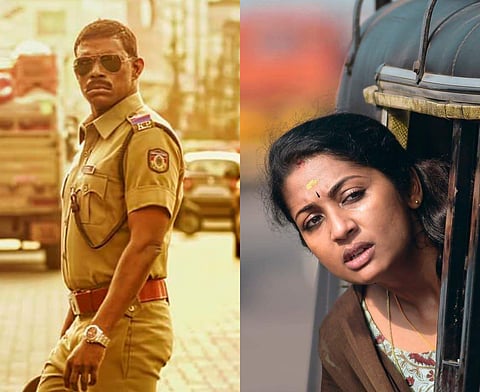Oruthee Movie Review: Navya Nair, Vinayakan dominate in VK Prakash's tense, empowering drama
Rating:(3.5 / 5)
Navya Nair attends a lot of phone calls throughout VK Prakash’s new film Oruthee, based on an actual event. So many calls that I’ve lost count. Most of them are anxiety-inducing. A few bear good news. Then there is the third, the empowering kind, from an unlikely ally whose life becomes intertwined with hers.
Director: VK Prakash
Cast: Navya Nair, Vinayakan, Santhosh Keezhattoor
Oruthee is primarily the story of an intense ordeal that Radhamani (Navya) goes through. Eventually, it also becomes the story of an empathetic, stoic, and tough-as-nails cop (a brilliant Vinayakan dominating every scene he is in). The film opens with the latter. His involvement in Radhamani’s life comes at a very crucial juncture. This development also makes it a movie about two characters empowering each other. But let me first tell you about Navya’s terrific, well-timed comeback in what I would call one of VKP’s finest films.
A striking image from Oruthee has Radhamani’s back profile framed against a group of high rise apartments on the other side of the water body separating her home from them. It symbolises, in my mind, her impending battle with some powerful, influential forces. A ferry conductor like herself cannot take them on alone. After all, this is not a mass film where the woman spews fiery dialogues and single-handedly overpowers anyone who dared to mess with her.
But then, the vulnerable Radhamani gradually evolves into a woman who discovers reservoirs of strength deep within her. In three days, she goes through so much that by the time the film nears its conclusion, she musters enough courage to take on anyone, no matter how high their pedestals. When Vinayakan enters the picture and shakes things up -- in multiple applause-worthy scenes -- the film becomes much more fun.
It all starts with Radhamani’s daughter getting admitted for food poisoning, an opportunity to bring up the purity of food products that claim to be trustworthy. When hospital expenses begin to mount, she has to think of a fast solution. Meanwhile, her husband (Saiju Kurup) is nursing a fracture after an accident at his workplace in Dubai. He was her initial cause of concern, later overshadowed by her daughter’s situation. When a solution presents itself, things don’t turn out as easy as they initially seemed. This time, the purity of another product from a ‘trustworthy’ brand is suspected. “We have been in the business 75 years,” repeats a shady jewellery shop manager when she seeks compensation.
VKP takes enough time to acquaint us with Radhamani’s personality in the film’s early portions. One might ask if the set-up needs that much time. How else would we know of Radhamani’s capabilities? Through the course of Oruthee, her face runs the gamut of emotions from worry to helplessness to frustration to anger.
If not for the intrusive background score, songs, or the occasional logic-devoid cinematic elements, one would’ve mistaken Oruthee for a documentary. Now it almost looks like one, considering how VKP and cinematographer Jimshi Khalid chose to shoot the daily routines of a working mother and her lower-middle-class lifestyle. Most notable is the handheld approach adopted to capture the urgent aspects of Radhamani’s life, sometimes with the appropriate use of silence.
And Navya makes the nerve-wracking routines of Radhamani look so organic. These scenes recalled Will Smith’s multi-tasking from The Pursuit of Happyness. One minute, Radhamani is looking for something, the next, she is looking for something else. Now combine that with five other tasks. One particular moment recalled a day when my mother went through a similar ordeal. I asked myself how I would react if I were in her place. I would’ve probably collapsed under the overwhelming heaviness.
Perhaps Navya’s real-life experience of motherhood came in handy here. (One chase scene involving Radhamani and her son brought to mind the father and son from Vittorio De Sica’s Bicycle Thieves.) You know that expression about some actors living their characters? That’s what you get here. I didn’t notice a single false note in Navya’s performance, except for a very minor detail. But it’s not that important because you are so caught up in this woman’s plight that you are more concerned about whether Radhamani would get what she wants.
Oruthee works because it has enough of the ingredient required for cinematic drama: The protagonist needs something, but one or more obstacles are in the way. Recently, Unni Mukundan dealt with multiple hindrances in Meppadiyan. Oruthee is relatively zippier, and I’m willing to overlook the minor flaws because the struggles of the protagonist is riveting.

